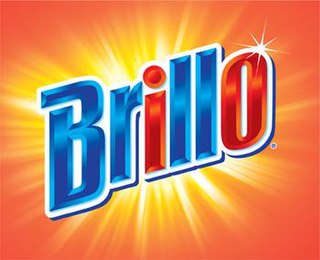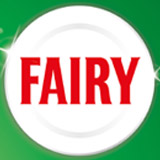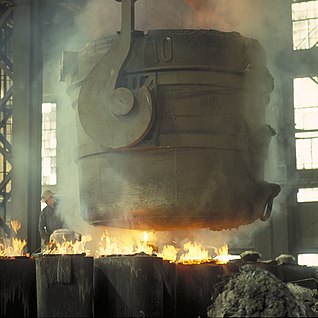
Kleenex is a brand name for a variety of paper-based products such as facial tissue, bathroom tissue, paper towels, tampons, and diapers. Often used informally as a genericized trademark for facial tissue in the United States, the name Kleenex is a registered trademark of Kimberly-Clark. Kleenex products are manufactured in 30 countries and sold in more than 170 countries. Kleenex brands include Cottonelle, Huggies, and VIVA.

Cookware and bakeware is food preparation equipment, such as cooking pots, pans, baking sheets etc. used in kitchens. Cookware is used on a stove or range cooktop, while bakeware is used in an oven. Some utensils are considered both cookware and bakeware.

Brillo is a trade name for a scouring pad, used for cleaning dishes, and made from steel wool impregnated with soap. The concept was patented in 1913, at a time when aluminium pots and pans were replacing cast iron in the kitchen; the new cookware blackened easily. The company's website states the name Brillo is from the Latin word for "bright", although no such word exists in Latin. In Spanish the word brillo means the noun "shine"; however, German, Italian, French, and English do have words for "shine" or "bright" beginning with brill- deriving from Latin words for beryl.
Chore Boy is a brand name for a coarse scouring pad made of steel wool, copper wool or non-metallic terry cloth and all-purpose sponges. It is ideal for cleaning BBQ grills, cookware, glassware, oven racks and stove burners. During the first half of the 20th century, the product was marketed under the name Chore Girl.

Persil is a German brand of laundry detergent manufactured and marketed by Henkel around the world except in the United Kingdom, Ireland, France, Latin America, China, Australia and New Zealand, where it is manufactured and marketed by Unilever. Persil was introduced in 1907 by Henkel. It was the first commercially available laundry detergent that combined bleach with the detergent. The name was derived from two of its original ingredients, sodium perborate and sodium silicate.

Steel wool, also known as iron wool, wire wool or wire sponge, is a bundle of very fine and flexible sharp-edged steel filaments. It was described as a new product in 1896. It is used as an abrasive in finishing and repair work for polishing wood or metal objects, cleaning household cookware, cleaning windows, and sanding surfaces.

Cillit Bang is the brand name of a range of cleaning products sold by the consumer products manufacturer Reckitt. The products marketed under the brand name include a degreaser, cleaning crystals, and a grime, rust, mould and limescale remover.

Fairy is a British brand of washing-up liquid and dishwasher detergent owned by the American company Procter & Gamble. Fairy Liquid is traditionally green, as mentioned in the well-known advertising jingle "Now hands that do dishes can feel as soft as your face with mild green Fairy Liquid".

Corning Ware, also written CorningWare, was originally a brand name for a unique glass-ceramic (Pyroceram) cookware resistant to thermal shock. It was first introduced in 1958 by Corning Glass Works in the United States. The brand was later spun off with the sale of the Corning Consumer Products Company subsidiary. Glass-ceramic based Corning Ware can be taken from the refrigerator or freezer and used directly on the stovetop, in an oven or microwave, under a broiler, for table / serving use, and when ready for cleaning put directly into a dishwasher. CorningWare is sold worldwide, and it is popular in North America, Asia, and Australia.

Weathering steel, often referred to by the genericised trademark COR-TEN steel and sometimes written without the hyphen as corten steel, is a group of steel alloys which were developed to eliminate the need for painting, and form a stable rust-like appearance after several years' exposure to weather.
Bluing is a passivation process in which steel is partially protected against rust using a black oxide coating. It is named after the blue-black appearance of the resulting protective finish. Bluing involves an electrochemical conversion coating resulting from an oxidizing chemical reaction with iron on the surface selectively forming magnetite, the black oxide of iron. In comparison, rust, the red oxide of iron, undergoes an extremely large volume change upon hydration; as a result, the oxide easily flakes off causing the typical reddish rusting away of iron. Black oxide provides minimal protection against corrosion, unless also treated with a water-displacing oil to reduce wetting and galvanic action. In colloquial use, thin coatings of black oxide are often termed 'gun bluing', while heavier coatings are termed 'black oxide'. Both refer to the same chemical process for providing true gun bluing.

Heavy-duty cookware made of cast iron is valued for its heat retention, durability, ability to be used at very high temperatures, and non-stick cooking when properly seasoned. Seasoning is also used to protect bare cast iron from rust. Types of cast iron cookware include frying pans, dutch ovens, griddles, waffle irons, flattop grills, panini presses, crepe makers, deep fryers, tetsubin, woks, potjies, and karahi.
Sugar soap, as typically found in Commonwealth countries, is a cleaning material of variable composition sold for use on surfaces affected by greasy or tarry deposits which are not easily removed with routine domestic cleaning materials. Its name arises from the fact that, when in dry powder form, it resembles table sugar.

Corelle Brands, LLC was an American kitchenware products maker and distributor based in Rosemont, Illinois. In 2019, the company merged with Instant Brands.

A kitchen utensil is a small hand held tool used for food preparation. Common kitchen tasks include cutting food items to size, heating food on an open fire or on a stove, baking, grinding, mixing, blending, and measuring; different utensils are made for each task. A general purpose utensil such as a chef's knife may be used for a variety of foods; other kitchen utensils are highly specialized and may be used only in connection with preparation of a particular type of food, such as an egg separator or an apple corer. Some specialized utensils are used when an operation is to be repeated many times, or when the cook has limited dexterity or mobility. The number of utensils in a household kitchen varies with time and the style of cooking.

A pot-holder is a piece of textile or silicone used to cover the hand when holding hot kitchen cooking equipment, like pots and pans. They are frequently made of polyester and/or cotton. Crocheted pot-holders can be made out of cotton yarn as a craft project/folk art.

Bar Keepers Friend is an American brand of mass-produced cleaning agents. The original canned scouring powder product has been manufactured and sold since 1882. It was invented by a chemist in Indianapolis, Indiana, where it continues to be manufactured by SerVaas Laboratories. The canned product's primary active ingredient is oxalic acid. Bar Keepers Friend has various cleaning uses.

Seasoning or curing is the process of coating the surface of cookware with a bioplastic formed from heated fat or oil in order to produce a heat, corrosion, and stick resistant hard coating. It is required for cast-iron cookware and carbon steel, which otherwise rust rapidly in use, but is also used for many other types of cookware, as it helps prevent food sticking.
Scouring powder is a household cleaning product consisting of an abrasive powder mixed with a dry soap or detergent, soda, and possibly dry bleach.















